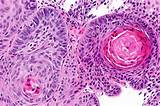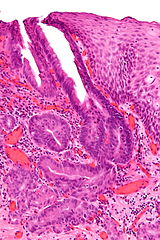Esophageal cancer pathophysiology: Difference between revisions
No edit summary |
|||
| Line 14: | Line 14: | ||
===Gross pathology=== | ===Gross pathology=== | ||
[[Squamous cell carcinoma]] or [[adenocarcinoma]] of the [[esophagus]] may appear as a flat, irregular [[plaque]] or a [[Polyp|polypoid]] lesion or an [[Ulcer|ulcerating]], fungating mass.<ref>{{cite book | last = Sugarbaker | first = David | title = Adult chest surgery | publisher = McGraw-Hill Education | location = New York | year = 2015 | isbn = 0071781897 }}</ref> | [[Squamous cell carcinoma]] or [[adenocarcinoma]] of the [[esophagus]] may appear as a flat, irregular [[plaque]] or a [[Polyp|polypoid]] lesion or an [[Ulcer|ulcerating]], fungating mass.Squamous cell carcinoma is usally found in the mid third of the esophagus, whilst the adeenocarcinoma is usually found in the lower third of the esophagus near the gastric opening.<ref>{{cite book | last = Sugarbaker | first = David | title = Adult chest surgery | publisher = McGraw-Hill Education | location = New York | year = 2015 | isbn = 0071781897 }}</ref> | ||
===Microscopic pathology=== | ===Microscopic pathology=== | ||
Revision as of 15:17, 6 December 2017
|
Esophageal cancer Microchapters |
|
Diagnosis |
|---|
|
Treatment |
|
Case Studies |
|
Esophageal cancer pathophysiology On the Web |
|
American Roentgen Ray Society Images of Esophageal cancer pathophysiology |
|
Risk calculators and risk factors for Esophageal cancer pathophysiology |
Editor-In-Chief: C. Michael Gibson, M.S., M.D. [1]Associate Editor(s)-in-Chief: Hadeel Maksoud M.D.[2]
Overview
The pathophysiology of esophageal cancer depends on the histological subtype.
Pathophysiology
The esophagus is lined by nonkeratinized stratified squamous epithelium. This lining is maintained as long as there are no stressors leading to a metaplastic change. These stressors may include genetic factors, chronic alcoholism, smoking, ingesting spicy foods and hot liquids frequently, and chronic gastroesophageal reflux. Over time a dysplastic change occurs followed by a metaplastic change which may be of the squamous cell or adenocarcinoma type.[1]
Pathology
Gross pathology
Squamous cell carcinoma or adenocarcinoma of the esophagus may appear as a flat, irregular plaque or a polypoid lesion or an ulcerating, fungating mass.Squamous cell carcinoma is usally found in the mid third of the esophagus, whilst the adeenocarcinoma is usually found in the lower third of the esophagus near the gastric opening.[2]
Microscopic pathology
Nuclear atypia of malignancy:
- Found in both types:
Squamous cell carcinoma
Atypical squamous cells with invasion through the basement membrane:
- Cytology:
- Nucleus - typically central
- Mitotic activity
- Cytoplasm - "dense-appearing", typically eosinophilic (may be intensely eosinophilic)
- Squamous whorls or keratin pearls may be present[3]

Adenocarcinoma[4]
- Invading cell clusters or glands
- Cribriforming (more than rare) or desmoplasia or "deep" invasion (into submucosa)

References
- ↑ Quante M, Graham TA, Jansen M (2017). "Insights into the Pathophysiology of Esophageal Adenocarcinoma". Gastroenterology. doi:10.1053/j.gastro.2017.09.046. PMID 29037468.
- ↑ Sugarbaker, David (2015). Adult chest surgery. New York: McGraw-Hill Education. ISBN 0071781897.
- ↑ "Squamous cell carcinoma of the esophagus".
- ↑ "Esophageal adenocarcinoma".